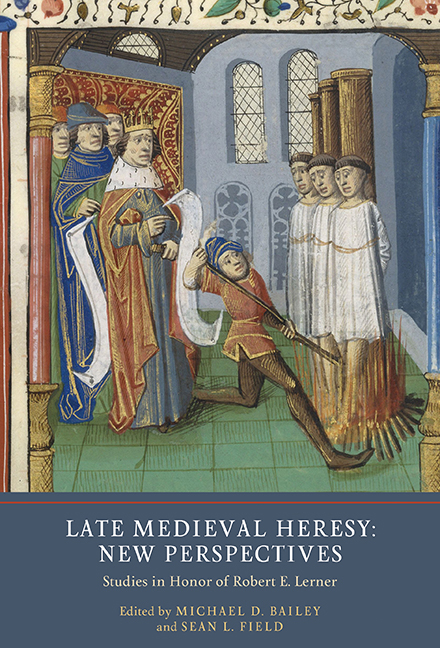Book contents
- Frontmatter
- Contents
- Preface: Robert E. Lerner: A Portrait
- List of Contributors
- Introduction: Historiography, Methodology, and Manuscripts: Robert E. Lerner and the Study of Late Medieval Heresy
- 1 The Heresy of the Templars and the Dream of a French Inquisition
- 2 The Dissemination of Barthélemy Sicard's Postilla super Danielem
- 3 Magic, Mysticism, and Heresy in the Early Fourteenth Century
- 4 The Making of a Heretic: Pope John XXII's Campaign against Louis of Bavaria
- 5 Unusual Choices: The Unique Heresy of Limoux Negre
- 6 Princely Poverty: Louis of Durazzo, Dynastic Politics, and Heresy in Fourteenth-Century Naples
- 7 Disentangling Heretics, Jews, and Muslims: Imagining Infidels in Late Medieval Pastoral Manuals
- 8 New Frontiers in the Late Medieval Reception of a Heretical Text: The Implications of Two New Latin Copies of Marguerite Porete's Mirror of Simple Souls
- 9 Disputing Prophetic Thought: The 1466 Questio quodlibetalis of Johannes of Dorsten
- 10 Heretics, Allies, Exemplary Christians: Latin Views of Ethiopian Orthodox in the Late Middle Ages
- 11 ‘By them in reality I meant the Jews’: Medieval Heretics in the Work and Life of Renate Riemeck (1920–2003)
- Afterword: Who or What Was a Heretic in the Late Middle Ages?
- Robert E. Lerner: A Chronological Bibliography
- Index
- York Medieval Press: Publications
11 - ‘By them in reality I meant the Jews’: Medieval Heretics in the Work and Life of Renate Riemeck (1920–2003)
Published online by Cambridge University Press: 14 June 2019
- Frontmatter
- Contents
- Preface: Robert E. Lerner: A Portrait
- List of Contributors
- Introduction: Historiography, Methodology, and Manuscripts: Robert E. Lerner and the Study of Late Medieval Heresy
- 1 The Heresy of the Templars and the Dream of a French Inquisition
- 2 The Dissemination of Barthélemy Sicard's Postilla super Danielem
- 3 Magic, Mysticism, and Heresy in the Early Fourteenth Century
- 4 The Making of a Heretic: Pope John XXII's Campaign against Louis of Bavaria
- 5 Unusual Choices: The Unique Heresy of Limoux Negre
- 6 Princely Poverty: Louis of Durazzo, Dynastic Politics, and Heresy in Fourteenth-Century Naples
- 7 Disentangling Heretics, Jews, and Muslims: Imagining Infidels in Late Medieval Pastoral Manuals
- 8 New Frontiers in the Late Medieval Reception of a Heretical Text: The Implications of Two New Latin Copies of Marguerite Porete's Mirror of Simple Souls
- 9 Disputing Prophetic Thought: The 1466 Questio quodlibetalis of Johannes of Dorsten
- 10 Heretics, Allies, Exemplary Christians: Latin Views of Ethiopian Orthodox in the Late Middle Ages
- 11 ‘By them in reality I meant the Jews’: Medieval Heretics in the Work and Life of Renate Riemeck (1920–2003)
- Afterword: Who or What Was a Heretic in the Late Middle Ages?
- Robert E. Lerner: A Chronological Bibliography
- Index
- York Medieval Press: Publications
Summary
Medievalists outside of Germany may be forgiven if they have never heard of the historian, publicist, and political activist Renate Riemeck. Only among those interested in the so-called Cryptoflagellants does her name retain some resonance. The Cryptoflagellant movement was a somewhat obscure phenomenon in fourteenth- and fifteenth-century Thuringia. Supposed members of this heretical group (if it really was a coherent group) were persecuted by inquisitors for practicing clandestine self-chastisement and adhering to millennial prophecies. Riemeck wrote her 1943 dissertation at the University of Jena about them but never published it. Only half a century later did she publish a journal article presenting the results of that thesis, which has led to some (not notably enthusiastic) reception by scholars. Moreover, the dissertation remained Riemeck's only rigorous scholarly work, although she did pursue an academic career and become a professor of history at several teachers’ colleges in Germany. Throughout her life Riemeck published articles and books, mostly on the subjects of Church history and dissidence, but these works were more or less popularizing or intended for teaching use and are now forgotten, although at the time many of them sold extremely well.
Why then write an essay about Renate Riemeck and medieval heretics? There are two parts to the answer. The first is that in the second half of the twentieth century, Riemeck was a well-known public figure in Germany due to her prolific output as a historian, her political activism in the pacifist and neutrality movement in West Germany around 1960, and her role as Ulrike Meinhof's foster-mother. Meinhof (1934–76) remains the nation's most famous terrorist. In 1970, she co-founded the far-left underground organization Rote Armee Fraktion (Red Army Faction), also known as the Baader-Meinhof Gang, which was responsible for several dozen political murders in Germany up until the 1990s. Riemeck had lived with Meinhof's mother Ingeborg from 1941 until the latter's premature death in 1949, and then took over custody of the fourteen-year-old Ulrike.
- Type
- Chapter
- Information
- Late Medieval Heresy: New PerspectivesStudies in Honor of Robert E. Lerner, pp. 215 - 237Publisher: Boydell & BrewerPrint publication year: 2018



